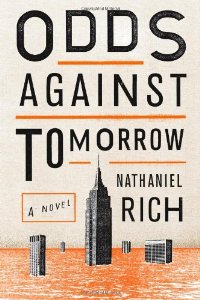Odds Against Tomorrow | Nathaniel Rich

I was abroad last week when the Boston Globe published my review of Nathaniel Rich’s Odds Against Tomorrow, while Boston itself was dealing with the kind of unpredictable, worst-case scenario Rich’s book deals with.
Rich’s novel is a product of our early twenty-first century obsession with disaster and calamity. Those of us who grew up in the time between the fall of the Soviet Union and September 11th remember a time when large-scale disasters and terror attacks seemed like abberations. Unlike our parents generation, our childhoods weren’t overshadowed by the threat of thermonuclear annihilation, and unlike our younger siblings (and possibly children), we weren’t pummeled by one major incident after another, starting with 9/11, through the anthrax attacks, Hurricane Katrina, London, Madrid, the 2008 financial crisis, Superstorm Sandy, and now Boston. As the Onion put it, “this is just going to be a thing that happens from now on.”
The protagonist of Odds Against Tomorrow becomes fixated on predicting disasters; his formative experience is the destruction of Seattle by an earthquake while he is a college student (a scene that felt very familiar, as I was a newly minted college freshman on September 11th). In the review, I talk about the dangers of complacency, about letting these things creep up on you and ignoring the warning signs, but I also talk about the dangers of excessive vigilance, how a preoccupation with an unknowable, and perhaps inevitable future can be even more damaging. In the Bush years, it felt like our country was continually jumping at its own shadow, so determined to stave off another attack that it became a national neurosis; we likely did more harm to ourselves than any malefactor could have.
So far, I’m heartened by the response in Boston. As a city, we’ve held fast, and so far the reaction has been appropriately proportional to the event itself. My hope is that we don’t return to those dark times of the mid-aughts, and that we’ve learned from our mistakes.
Decades from now, when students and historians are trying to understand this troubled and turbulent time in our history, Odds Against Tomorrow will likely be on the reading list. It is a book of its time, and does a good job of peeling back the motives, fears, and anxieties of a society coming to terms with the true instability and uncertainty of life.
 |
|